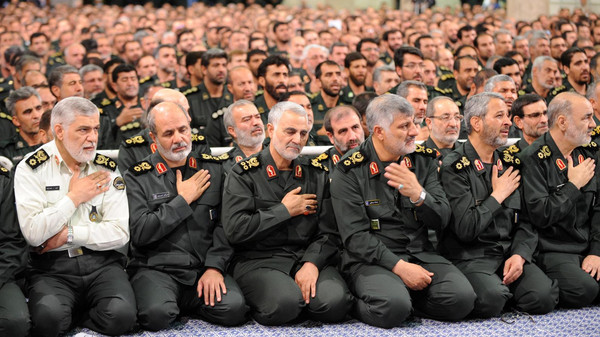Policy recommendations for Trump in Middle East
By Dr. Majid Rafizadeh/Al Arabiya/November 11/16
The Trump administration should pursue firm policies in countering Iran’s militaristic, hegemonic and ideological ambitions. In the eight years of Barack Obama’s presidency, the lobbyists for the Iranian regime have succeeded in pushing appeasement policies with Iranian leaders, giving billions of dollars to Iran, and in making Washington hesitant when it to comes to Iran’s military adventurism and anti-American posturing. These policies have turned the tension into regional conflagration.
President Obama and Iranian lobbyists played the public well by arguing that appeasing Iran’s leaders will make Iran a constructive player and more moderate. The creation of concepts such as “moderates” versus “hardliners” is a Western fallacy and fabrication. In Iran, authorities do not use these concepts.
Iran’s politicians across the political spectrum might use different means but they try to achieve the same objectives: preserving the political establishment of the Islamic Republic, Velayate Faqih (the Supreme Leader) and the revolutionary principles of 1979.
A lesson in history
Trump should observe and learn the bitter lessons derived from the two terms of the Obama administration. The last eight years gave us evidence that appeasement policies with the Iranian government are not only fruitless, but also a danger to Washington’s and its allies’ national security, geopolitical, strategic and economic interests. President Obama began his presidency by extending his hand to Iran’s Supreme Leader, Ayatollah Ali Khamenei. Khamenei immediately rejected and humiliated the US.
Obama did not give up. The nuclear negotiations began with the promise that lifting of the UN Security Council’s sanctions against Iran would be considered a solution to satisfy Iran. Yet Iranian leaders did not show any signs of change in their policies. Khamenei continued lashing out at America, the “Great Satan”.
Following every anti-American speech that Iranian leaders delivered, Obama gave more concessions and exemptions, and signed “secret” deals. Iran kept all its nuclear infrastructure and decades of sanctions were lifted immediately even before Iran had to comply with the flimsy terms of the nuclear deal.
The last eight years gave us evidence that appeasement policies with Iran are not only fruitless, but also a danger to Washington’s and its allies’ national security, geopolitical, strategic and economic interests. After the nuclear agreement, Iran began publicly, and more aggressively, test firing ballistic missiles in violation of the United Nations resolutions. Iran publicly admitted that its Revolutionary Guard Corps and Quds force – the elite branch of the IRGC that operates in foreign countries – are fighting on the ground in Syria, helping President Assad’s regime.
President Obama continued his reticent stance. Iran became economically empowered as billions of dollars flowed into Iran and Tehran gained global legitimacy as Washington did not condemn Iran for it violations and aggressions.
Iran sent more weapons to its proxies including the Houthis, while the US intercepted five Iranian shipments of weapons after the nuclear agreement. Iran’s proxy, the Houthis, attacked the US navy threatening US national security. However, President Obama continued with his appeasement policies.
Iran became more emboldened and began publicly escalating harassment of US Navy ships and detaining American Navy officers, forcing them to divulge sensitive information, and posting videos of a US sailor crying and handcuffed, in an attempt to further humiliate the US.
Hardball tactics
Iranian leaders learned that hardball tactics plays well with the US. Anti-Americanism and Anti-Semitism increased. Khamenei reasserted Iran’s position that the US will remain Iran’s number one enemy. He stated that the Iranian nation ousted the Satan and that we should not let it “back through the window”.
The IRGC leaders repeatedly threatened several countries in the region. Iran threatened Israel with their missile capabilities and Khamenei openly threatened the destruction of Israel as he pointed out: “Some Zionists have said that regarding the result of the nuclear deal they (Israelis) have been relieved of concerns about Iran for 25 years. But we tell them that you will not see the coming 25 years and God willing there will not be something named the Zionist regime in the region.”
Iran’s hostage taking of Americans took the spotlight again. The country arrested American citizens as hostages while its military publicly demanded billions of dollars as ransom to release them. Some politicians claim that Obama paid a ransom to release four Iranian-American citizens. Iran arrested more afterwards.
Iran’s military adventurism and the IRGC’s deployment of hard power significantly increased across the region in order to expand Tehran’s military empire and advance Khamenei’s regional hegemonic ambitions. Iran gave birth to many Shiite militias in Iraq and Syria. Iranian leaders bragged about dominating four Arab capitals (Baghdad, Beirut, Damascus, Sana’a).
The Russia-China-Iran axis has strengthened, tipping the global balance of power against the US and its European allies. Russia intensified airstrikes in Syria and ratcheted up its efforts to undermine the US global role.
Domestically speaking, Iran tightened the rules on personal freedoms, social justice, liberty and women rights. Human rights violations increased under Rowhani’s presidency and Iran was ranked number one in executing people per capita. Executions surged to a 25 year-high.
Three-pronged policy for Trump
Trump administration should take a three-pronged approach toward the Iranian government. Regionally speaking, Washington needs to hold Iran accountable for any aggression, anti-US and anti-Israeli rhetoric. Washington should take legal action when Iran violates UN security resolution such as test firing ballistic missiles or breaching the arms embargo.
The US should stand with its Middle eastern allies to counter the IRGC expansion of its stranglehold in the region and should drive the IRGC forces out of foreign territories. Financing of Iran’s proxies and delivery of arms to them should be countered appropriately.
Domestically speaking, the US should not turn a blind eye to, but instead, needs to publicly condemn Iran’s increasing human rights violations. Washington ought to support Iran’s civil society, opposition groups, and Persian media outlets that seek to advance democratic values in Iran. With regards to the nuclear agreement, several reports have revealed that Iran has already violated the nuclear deal by attempting to purchase materials that are only used for developing nuclear weapons.
The US should not solely rely on the IAEA to inspect Iran. IAEA has repeatedly failed in monitoring Iran as several clandestine nuclear sites had been revealed. The US should take serious action to bring these violations to the attention of the UN Security Council members. Since Russia and China will support Iran, the US should take unilateral proportionate action such as re-imposing Obama’s repealed sanctions on Iran.
President Obama and lobbyists for the Iranian regime played the Americans well in the last eight years. But we learned that reticence to Iran’s hegemonic ambitions and appeasement with Iranian leaders only results in more conflicts, destruction, anti-American policies, anti-Israeli sentiments, and human rights violations. If appeasement policies with Iran continue, regional conflict will exacerbate.
Trump administration should avoid silence and appeasement policies toward the Iranian regime and should proportionately counter Iran’s hegemonic ambitions.



















